
Current Research in Nutrition and Food Science
Scope & Guideline
Advancing knowledge for a healthier tomorrow.
Introduction
Aims and Scopes
- Nutritional Science and Health:
Research exploring the relationship between diet, nutrition, and health outcomes, including studies on dietary interventions, nutrient absorption, and the role of specific food components in disease prevention. - Food Technology and Innovation:
Studies focusing on the development and optimization of food products, including the use of novel ingredients, food processing methods, and food preservation techniques to enhance nutritional value and safety. - Consumer Behavior and Food Acceptance:
Research investigating consumer preferences, sensory evaluation, and acceptance of various food products, aiming to understand the factors influencing dietary choices and food consumption patterns. - Food Safety and Quality Assurance:
Papers addressing food safety issues, including microbial contamination, foodborne diseases, and the efficacy of food preservation methods to ensure the safety and quality of food products. - Ethnobotany and Traditional Foods:
Exploration of traditional dietary practices and the nutritional properties of indigenous foods, emphasizing the cultural significance and potential health benefits of local food systems.
Trending and Emerging
- Functional Foods and Nutraceuticals:
There is a growing interest in the health benefits of functional foods and nutraceuticals, focusing on bioactive compounds and their roles in disease prevention and health promotion. - Impact of COVID-19 on Dietary Habits:
Research examining the effects of the COVID-19 pandemic on dietary habits and food security has surged, showcasing how global crises influence consumer behavior and nutrition. - Sustainable and Local Food Systems:
An increasing emphasis on sustainability and local food sourcing is evident, with research exploring the nutritional and health benefits of locally produced foods and the impact of agricultural practices on food security. - Plant-Based Diets and Alternatives:
The popularity of plant-based diets and alternative protein sources is on the rise, driving research into their nutritional implications, environmental benefits, and consumer acceptance. - Food Safety and Health Regulations:
Recent trends indicate a heightened focus on food safety regulations and consumer awareness regarding food labeling, additives, and the health implications of food choices.
Declining or Waning
- Traditional Nutritional Practices:
Research on traditional dietary practices has decreased, possibly due to the growing interest in modern nutritional science and dietary trends, overshadowing the importance of indigenous food knowledge. - Micronutrient Deficiency Studies:
Although still relevant, studies specifically focused on micronutrient deficiencies have become less prominent as broader dietary patterns and holistic nutrition approaches gain traction. - Food Packaging Innovations:
The emphasis on innovative food packaging technologies has diminished, likely due to the saturation of research in this area and a shift towards more pressing topics such as sustainability and food waste.
Similar Journals
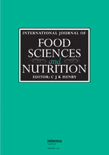
INTERNATIONAL JOURNAL OF FOOD SCIENCES AND NUTRITION
Connecting research and practice in food science.International Journal of Food Sciences and Nutrition, published by Taylor & Francis Ltd, is a premier, peer-reviewed journal that has established itself as a leading platform for the dissemination of cutting-edge research in the field of food science and nutrition. With an impressive Q1 categorization and an academic rank of #59/389 in Scopus’s Agricultural and Biological Sciences category, this journal is recognized for its significant impact, facilitating critical discussions and advancements related to food quality, safety, and nutritional health. Its historical significance, covering research from as early as 1947 to the present day, underscores the journal's long-standing commitment to scientific rigor and innovation. Researchers and professionals benefit from this journal's comprehensive and diverse range of studies, contributing to informed practices and developments in the food industry and public health. Although the journal is not open access, it provides various access options, ensuring that high-quality research is available to academics and practitioners alike. Stay connected with current trends and breakthroughs in food sciences and nutrition through this highly respected publication.
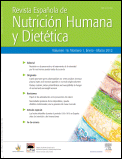
Revista Espanola de Nutricion Humana y Dietetica
Innovating dietary practices for public health.Revista Espanola de Nutricion Humana y Dietetica is a pivotal open-access journal dedicated to advancing the study of human nutrition and dietetics. Published by the ASOC ESPANOLA DIETISTAS NUTRICIONISTAS in Spain, this journal has been making significant contributions to the field since its inception in 2011. With an ISSN of 2173-1292 and an E-ISSN of 2174-5145, it provides researchers and practitioners with a valuable platform for disseminating innovative research, case studies, and reviews related to nutrition science. Although currently ranked Q4 in both Food Science and Nutrition and Dietetics categories (2023), the journal is committed to raising its academic profile by fostering high-quality publications that address contemporary issues in nutrition. Open access since 2012, it ensures that research is readily available to a global audience, thus promoting the exchange of knowledge and best practices. Emphasizing the importance of dietary interventions and public health nutrition, the journal encourages contributions that bridge theory and practical applications, appealing to a broad spectrum of professionals, researchers, and students within the field.

Journal of Food and Nutrition Research
Advancing the Science of Nutrition and Food QualityJournal of Food and Nutrition Research, published by the VUP FOOD RESEARCH INST in Bratislava, Slovakia, serves as a vital platform for disseminating cutting-edge research in the fields of food science and nutrition. With an ISSN of 1336-8672 and an E-ISSN of 1338-4260, this journal emphasizes the importance of interdisciplinary approaches to address contemporary challenges related to food quality, dietary practices, and nutritional health. Notably recognized in the 2023 Scopus rankings, the journal is classified in Q3 quartiles for both Food Science and Nutrition & Dietetics, providing a forum for researchers aiming to enhance knowledge and practices within these domains. Those engaged in academia and industry will find the journal invaluable for its comprehensive scope, which covers novel food technologies, nutrition interventions, and the implications of dietary behaviors. Though not open access, the journal is dedicated to enriching the academic conversation and contributing to advancements in public health and nutrition policies.
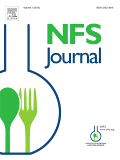
NFS Journal
Transforming the landscape of food science and dietetics.NFS Journal, published by ELSEVIER, is at the forefront of research in the fields of Food Science and Nutrition and Dietetics, boasting an impressive impact factor that underscores its significance. With an Open Access model since 2015, the journal facilitates widespread dissemination and accessibility of high-quality research, making it a valuable resource for scholars and practitioners alike. Located in Germany, this journal has made its mark with its prestigious Q1 ranking in both Food Science and Nutrition and Dietetics as of 2023, positioning it among the top-tier journals in these disciplines. Additionally, it holds an outstanding standing in Scopus rankings, being placed at 10th out of 140 in Nutrition and Dietetics and at 27th out of 389 in Food Science, reflecting its influence and reach within the global academic community. The NFS Journal is dedicated to publishing the latest advancements and practices that shape our understanding of the relationship between food, health, and nutrition, appealing to researchers, professionals, and students eager to stay updated with novel insights and breakthroughs.

FOOD TECHNOLOGY
Unveiling Trends in Food Science and EngineeringFOOD TECHNOLOGY, published by the Institute of Food Technologists, is a pivotal journal dedicated to the advancement of knowledge and innovation in the food industry. With its ISSN 0015-6639, this esteemed publication aims to bridge the gap between food science research and practical applications, addressing ongoing challenges and technological advancements in food production, preservation, and safety. Although currently not an open-access journal, FOOD TECHNOLOGY continues to serve as a critical resource for food scientists, engineers, and industry professionals seeking to stay at the forefront of emerging trends and research in the field. Recognized for its impact within the academic community, it holds a Q4 ranking in Chemistry, Food Science, and Industrial and Manufacturing Engineering categories, reflecting its importance in disseminating valuable information. Researchers and practitioners alike will find in its pages a wealth of insights that can influence practices and policies in food technology. The journal's editorial team, committed to upholding rigorous standards, ensures that each issue is a thorough representation of high-quality research and a valuable addition to the body of food science literature.
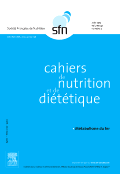
CAHIERS DE NUTRITION ET DE DIETETIQUE
Illuminating Trends in Health and Dietary ResearchCAHIERS DE NUTRITION ET DE DIETETIQUE, published by MASSON EDITEUR, is a prestigious journal in the fields of Nutrition and Dietetics, aiming to disseminate critical research and innovative practices from 1973 to the present. This journal serves as a platform for researchers, professionals, and students to explore key developments and emerging trends in the dietary sciences. Although currently classified in the Q4 quartile for both Medicine and Nutrition and Dietetics, its commitment to fostering academic discourse is evident through its rigorous publication process. With a focus on enhancing understanding of nutrition-related issues, CAHIERS DE NUTRITION ET DE DIETETIQUE remains an essential resource for anyone engaged in health and dietary research. Located in France, the journal continues to contribute to the scholarly community, despite the absence of Open Access options, making it a significant publication in its category.

Food Science and Human Wellness
Advancing the Nexus of Nutrition and WellnessFood Science and Human Wellness, published by TSINGHUA UNIVERSITY PRESS, is an esteemed open-access journal that has been at the forefront of advancing research in the interdisciplinary fields of food science and human health since its inception in 2012. With an impressive impact factor indicative of its quality and relevance, this journal holds a prestigious Q1 ranking in Food Science according to 2023 metrics, reflecting its commitment to high-caliber research and innovation. The journal is positioned within the top 12% of its category, ranked 46th out of 389 in Agricultural and Biological Sciences. The journal not only publishes original research articles but also critical reviews, perspectives, and innovations that contribute significantly to our understanding of the relationship between nutrition, wellness, and food science. With its Open Access model, Food Science and Human Wellness ensures that its valuable content is available to a global audience, fostering collaborative advancements in this vital field. Researchers, professionals, and students are invited to explore insightful discussions and impactful studies that aim to enhance public health and food safety.
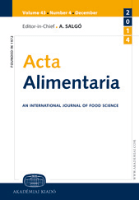
ACTA ALIMENTARIA
Advancing food science through rigorous research.ACTA ALIMENTARIA is a renowned journal in the field of food science, published by AKADEMIAI KIADO ZRT, based in Hungary. Since its inception in 1973, it has served as a vital platform for disseminating high-quality research on food chemistry, microbiology, nutrition, and technology, contributing significantly to the advancement of knowledge in the agricultural and biological sciences. Currently classified in the Q3 quartile of the 2023 Food Science category, the journal is positioned to address pressing issues pertaining to food safety, quality, and sustainability, making it an invaluable resource for researchers, professionals, and students alike. Although it does not currently offer open access, the journal maintains a strong reputation with a readership keenly interested in the latest developments in food science. With a Scopus rank placing it in the 38th percentile of its category, ACTA ALIMENTARIA continues to be a pivotal reference for those engaged in food research and innovation.

International Food Research Journal
Unveiling Breakthroughs in Food Science and TechnologyThe International Food Research Journal, published by UNIV PUTRA MALAYSIA PRESS, serves as a pivotal platform for disseminating innovative research within the field of food science. With an ISSN of 1985-4668 and an E-ISSN of 2231-7546, the journal has successfully established its presence since its inception in 2007, converging its findings through 2024. This esteemed journal holds a Q3 ranking in Food Science, illustrating its valuable contributions to the field as demonstrated by its Scopus rank of 276 out of 389, placing it in the 29th percentile among its peers in Agricultural and Biological Sciences. Although it operates under a traditional publishing model, its academic integrity and focus on high-quality research ensure that it remains a vital resource for researchers, professionals, and students eager to explore advances in food technology, nutrition, and safety. By encouraging interdisciplinary collaboration and critical dialogue, the International Food Research Journal plays an essential role in shaping the future of food science research.
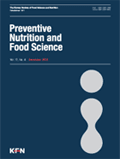
Preventive Nutrition and Food Science
Fostering Knowledge to Combat Contemporary Nutritional ChallengesPreventive Nutrition and Food Science, an esteemed journal published by the Korean Society of Food Science and Nutrition, serves as a pivotal platform for the dissemination of innovative research and insights in the fields of food science, nutrition, and dietetics. With an ISSN of 2287-1098 and an E-ISSN of 2287-8602, this journal is dedicated to advancing knowledge from 2012 through 2024, showcasing contributions that reflect the interplay between nutrition, health, and preventive strategies. Indexed in Scopus, it proudly holds a Q2 ranking in Food Science and a Q3 ranking in Nutrition and Dietetics as of 2023, positioning it among influential publications within these disciplines. Researchers, professionals, and students can explore cutting-edge studies that contribute significantly to evidence-based practices, enhancing public health and nutritional care. Although it operates under a subscription model, the journal plays a crucial role in fostering a deeper understanding of preventive nutrition, advocating for advancements that address contemporary dietary challenges.